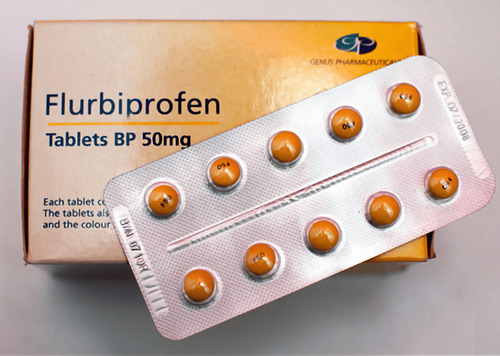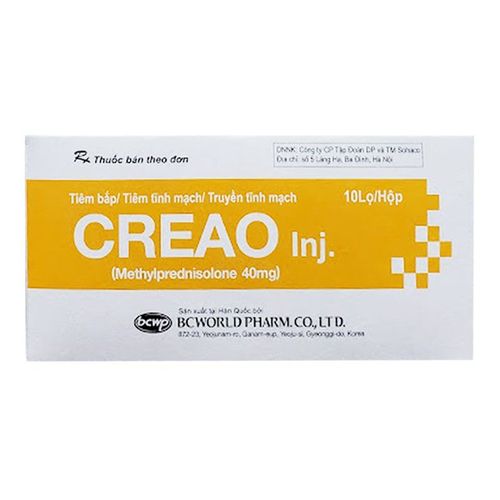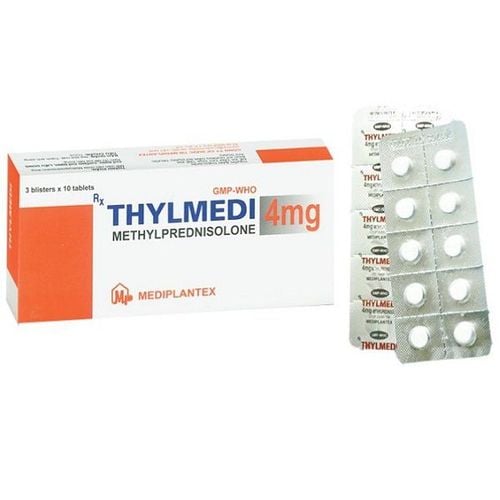This is an automatically translated article.
Sifasolone is manufactured by Tianjin Pharma Jiaozuo Co. The drug is prepared in the form of lyophilized powder for injection to be administered intramuscularly or injected at the site of inflammation.
1. The main ingredient of the drug Sifasolone
The main ingredient of Sifasolone is Methylprednisolone sodium succinate, 40mg content. The drug is prepared in the form of lyophilized powder for injection. This is a product of Tianjin Pharma Jiaozuo Co., Ltd - CHINA, circulating in Vietnam with registration number VN-10179-10.2. What are the effects of Sifasolone?
Methylprednisolone is a synthetic glucocorticoid, this active ingredient is a 6-alpha-methyl derivative of Prednisolone used for anti-inflammatory, immunosuppressive. Methylprednisolone is used either esterified or non-esterified to treat conditions where corticosteroids are indicated.
Due to the methylated formulation of Prednisolone, Methylprednisolone has only minimal mineralocorticoid activity (minor salt metabolism), so this active ingredient would not be suitable for the sole treatment of adrenal insufficiency. If Methylprednisolone is used in this case, an additional mineralocorticoid must be used.
Methylprednisolone is a drug with anti-inflammatory, immunosuppressive and anti-proliferative effects. The anti-inflammatory effect is due to the fact that methylprednisolone reduces the production, release and activity of anti-inflammatory mediators (such as histamine, prostaglandins, leucotriene...), thereby inhibiting the initial expression of anti-inflammatory agents. inflammatory process.
Methylprednisolone also inhibits leukocytes from sticking to the damaged vessel wall and migrating there, which leads to reduced permeability, fewer white blood cells to the injured area, reduced extravasation, reduce swelling, edema, pain.
Immunosuppressive properties will reduce the response to allergens, this is possible because the drug inhibits the toxic effect of the antigen-antibody complex that causes allergic vasculitis in the skin, thanks to the effect of lymphokines, target cells and macrophages, corticosteroids to reduce the allergic contact dermatitis reaction.
In addition, Methylprednisolone also prevents sensitive T lymphocytes and macrophages from reaching target cells, and the anti-proliferative effect will reduce tissue hyperplasia characteristic of psoriasis.
3. Indications of the drug Sifasolone
Indications of Sifasolone drug in the following cases:
Sifasolone drug is used in adrenocortical function abnormalities; Treatment of allergic disorders; Sifasolone is used in diseases of the skin, gastrointestinal tract, respiratory tract, hematology, eyes, liver, kidneys, nerves; Treatment of hypercalcemia caused by tumors; Treatment of arthritis, rheumatism, tendonitis; Used in nerve injuries; Sifasolone is used to treat pericarditis.
4. Dosage - How to use Sifasolone drug
4.1. Local injection of Sifasolone Arthritis and rheumatism are treated with Sifasolone for 1 - 5 weeks at a dose of 4 - 80mg, depending on the joints; Tendonitis using Sifasolone dose 4 - 40 mg; Skin diseases: Sifasolone dose 20-60 mg. 4.2. Intramuscular Sifasolone Used in increasing adrenal hormone secretion Sifasolone dose 40mg/2 weeks; Dosage in rheumatism: 40 - 120 mg/week; Use Sifasolone in skin diseases intramuscularly at a dose of 40 - 120 mg / 1 - 4 weeks; Asthma taking Sifasolone at a dose of 80 - 120 mg/week or every 2 weeks (allergic rhinitis); Exacerbation of multiple sclerosis: Sifasolone 160mg/day for 1 week, then 64mg/day for 1 month.
5. Contraindications of Sifasolone
Do not use Sifasolone medicine for patients who are allergic to Sifasolone drug components, patients with systemic fungal infections.
6. Side effects of Sifasolone
During the use of Sifasolone medicine, patients may experience some of the following side effects:
Sifasolone drug has the ability to cause adrenal insufficiency; Bacterial and parasitic infections: Sifasolone drugs mask signs of infection, latent infections become active, opportunistic infections; Sifasolone drugs cause immune system disorders: leading to hypersensitivity reactions, including anaphylaxis, with/without cardiovascular collapse, cardiac arrest, bronchospasm; Endocrine disorders: Sifasolone drug causes the development of a pseudo-Cushing state, inhibiting the pituitary-adrenal axis; Metabolic and nutritional disorders: Sifasolone drug causes sodium accumulation, fluid accumulation, hypokalemic alkalosis - hypokalemia, decreased tolerance to hydrocarbons, latent diabetes mellitus, increased insulin requirements or the need to increase the dose of oral antidiabetic drugs. in people with diabetes; Nervous system disorders: increased intracranial pressure with edema, convulsions; Eye disorders: Cataracts under the vitreous, protrusion; Heart disorders: Congestive heart failure, myocardial rupture after myocardial infarction, arrhythmia; Vascular disorders: Increased/lower blood pressure, petechiae; Respiratory, thoracic and mediastinal disorders: Persistent hiccups at high doses; Gastrointestinal disorders: Mouth ulcers, possible gastric perforation/bleeding, pancreatitis, esophagitis, intestinal perforation; Skin/subcutaneous tissue disorders: Bruising, thinning of the skin; Musculoskeletal and connective tissue disorders: Myopathy, muscle weakness, osteoporosis, aseptic necrosis; Reproductive system disorders: Menstrual irregularities; General disorders: Difficulty in wound healing, growth retardation in children; Research: Potassium depletion, increased ALT, alkaline AST phosphatase, negative nitrogen balance due to protein catabolism, increased intraocular pressure, impaired response to skin test, pathological fracture, spinal compression fracture, tendon rupture.
7. Be careful when using Sifasolone
Be careful when using Sifasolone in the following cases:
Be careful when using Sifasolone for pregnant women, nursing mothers; Avoid administering Sifasolone to patients with ocular herpes. Sifasolone medicine has the main ingredient of Sifasolone medicine which is Methylprednisolone sodium succinate. The drug is prescribed by doctors for use in many diseases. To ensure effective treatment and avoid unwanted side effects, patients need to strictly follow the instructions of doctors and medical staff.
Follow Vinmec International General Hospital website to get more health, nutrition and beauty information to protect the health of yourself and your loved ones in your family.













